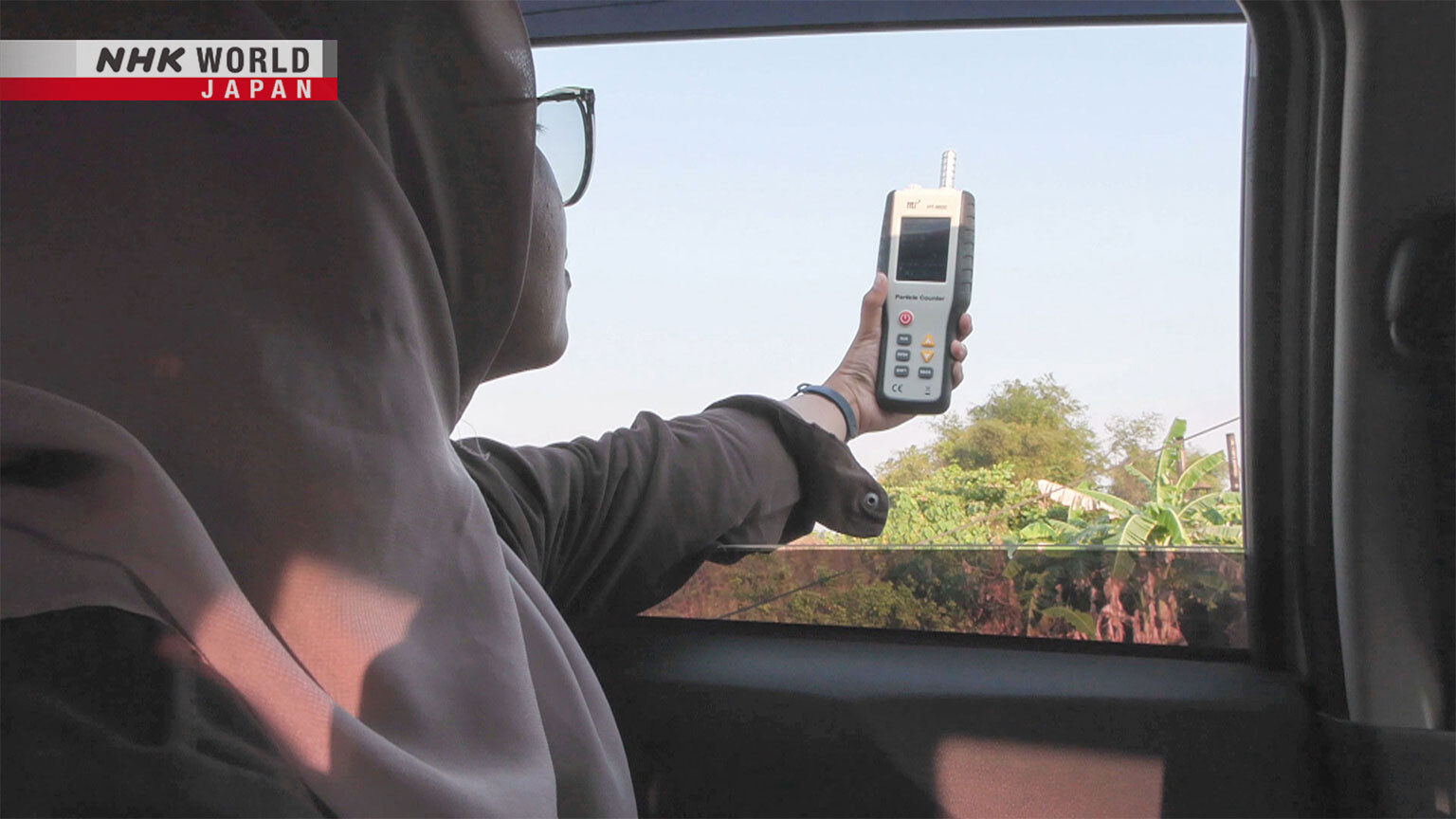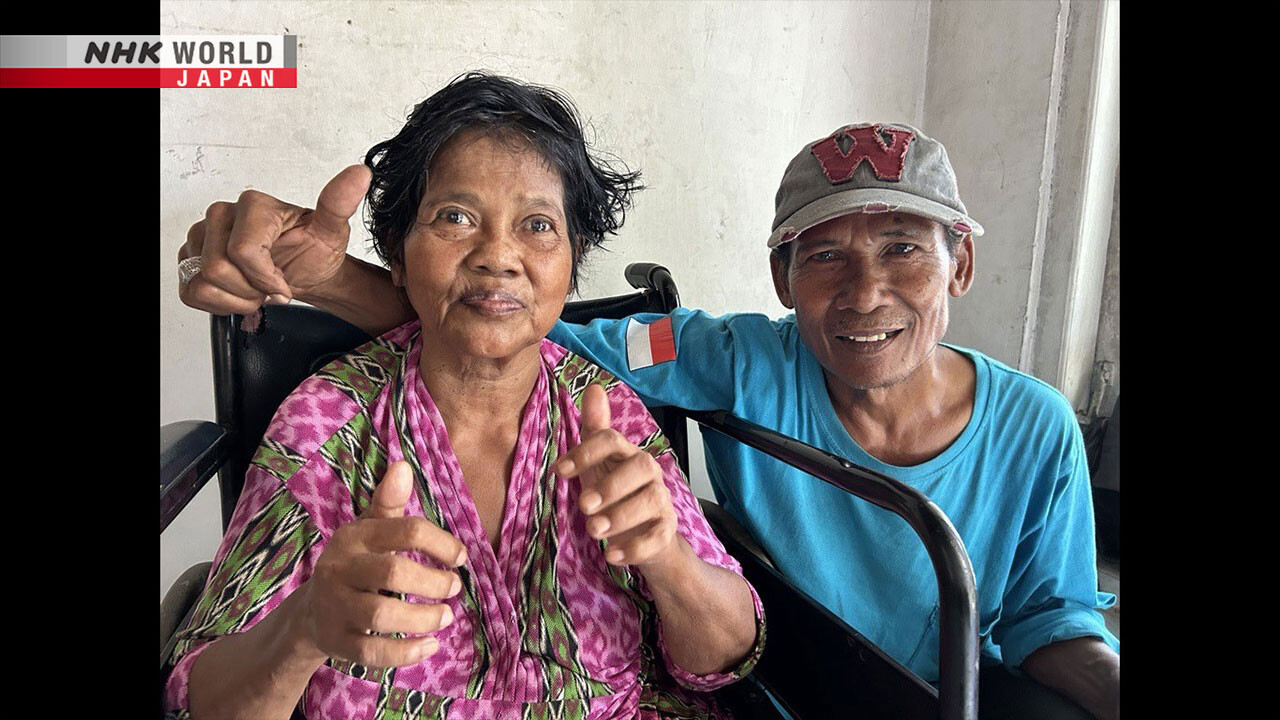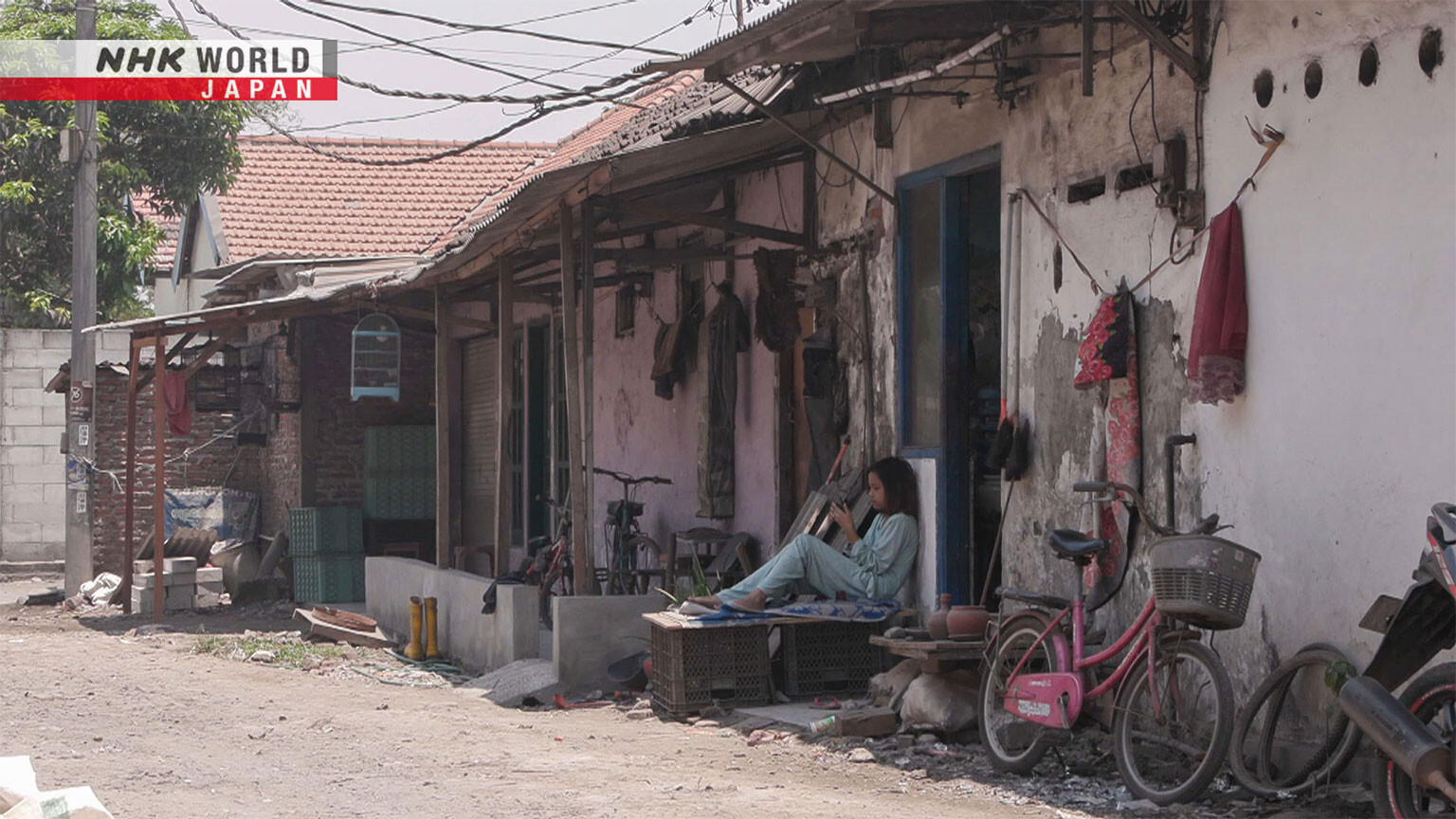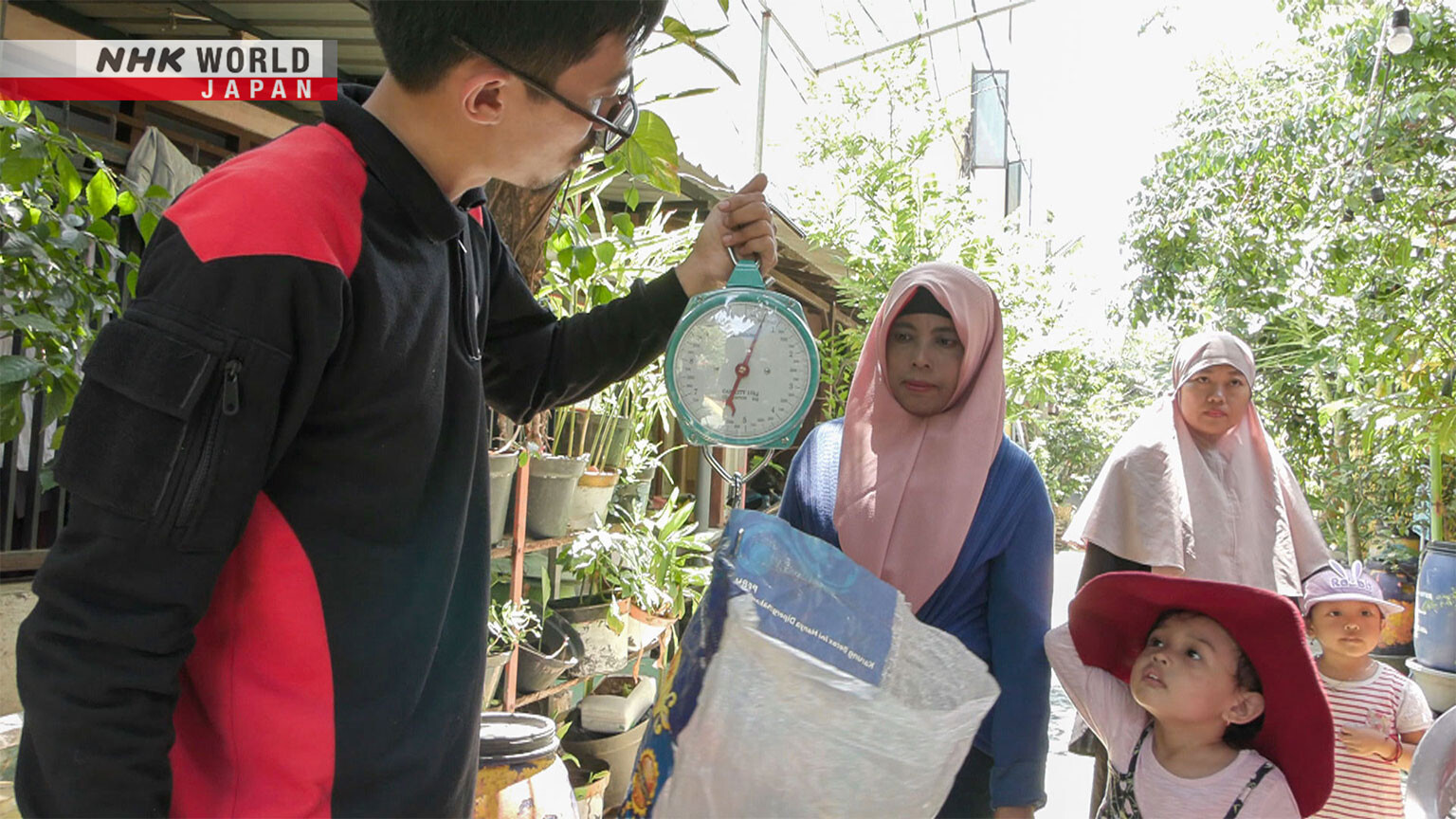Anthropocene is when human activity started profoundly impacting our planet. Inconvenient truths pile up in some of Indonesia's poorest communities, where "plastic farmers" can barely make ends meet.




Transcript
One day, we'll all be gone. But Earth will still show traces of what we've done.
Mass consumption is profoundly impacting the environment.
Our waste doesn't simply disappear.
Some of the poorest communities bear the brunt of our excesses.
This used to be all wetland.
We would go without work for days.
We had to survive, somehow.
- Hello!
- Hello!
Every day, certain materials are brought into the village.
Plastic.
Most of this waste has travelled thousands of kilometers from the United States, Europe and Japan.
We sell it.
I can take care of my wife now.
Everyone does it here.
Local authorities have banned bringing large volumes of waste into the village.
This job is a secret. It is actually against the rules.
We work under the radar. It's not what we want.
The planetary epoch we live in - the epoch we made - has been dubbed the Anthropocene.
This is my patch.
Buadi was the first person in the village to earn money from the waste.
Hello.
She's a plastic farmer, too.
- "You sift through the trash?"
- Yes. Every day.
About 150 households toil away like this.
Excuse me.
A TV crew from Japan is here.
These bigger ones fetch a higher price.
"You get paid more for the big stuff?"
Yes. And I'm glad.
This has wire in it. It'll go for a good price.
This contains iron. It will also sell for a nice price if we can separate it.
The villagers pick through the trash for anything that can be recycled.
The cables are burned to extract the metal within.
But mounds of trash remain.
The villagers dry what they harvest on the ground.
And that's why they're known as the plastic farmers.
It's no good if it's not dry.
It takes three or four days. Rain can be a problem.
The villagers load their livelihoods onto trucks.
- "Where is it going?"
- To the plants.
- "It's leaving?"
- Yes, directly to the plants.
- "Are they up ahead?"
- Yes, we're going there now.
The plants are a 20-minute drive away.
You can feel the air changing.
And you can smell it. The stench.
See the smoke?
All from the plants.
There are more than 60 in Tropodo - a small community known as the village of smoke.
And under the dark plumes, women can be found working day in, day out.
They make deep-fried tofu.
Their rudimentary kitchens are fueled by the plastic waste.
Vast amounts of the stuff. Relentlessly shoveled in.
We need a strong fire.
Otherwise, the tofu won't taste good.
Without heat, it sticks.
"Watch out!"
Need to be careful.
The kitchens used to run on wood.
But the introduction of plastic fuel has changed everything.
We are afraid this waste will become a problem.
We get the blame. People find fault with anything.
We were forced to temporarily shut down. Because of the air pollution.
I don't know if there's another way.
Local authorities suggested we use wood. But it's expensive.
We wouldn't make a profit. We'd fall into the red.
Many places have gone bankrupt.
We don't have a choice.
Here, trash from the developed world is a necessary evil.
The Anthropocene is when human activity started seriously affecting the earth's ecosystems.
And experts want to know more.
They're working in 12 locations around the world such as Europe, the United States, China and Japan.
The project is led by Professor Colin Waters.
Even something as minor as a little trilobite walking for a few minutes across the surface of this ocean
- the sediment - at the bottom of the ocean at least
- has created these marks which have been permanently preserved.
So now, 500 million years, we can see these.
I think the interesting thing is what sort of temporary features that humans are creating will we see in the sediments of the future.
One team works in Kyushu, southwestern Japan.
This is a sediment sample from Beppu Bay.
It shows seabed accumulations over the past century.
The researchers looked for traces of human activity in every year.
And they detected a spike.
The sharp rise began around 1950.
We started having a major impact on the Earth.
Like a tradeoff for the development of humankind.
Telltale signs include a byproduct from burning oil and coal at high temperatures.
Large amounts were detected from the middle of the 20th century.
Heavy metals, too.
And plutonium. From the testing of nuclear bombs.
These sudden trends didn't just happen by chance.
World War Two was over, and many countries were getting back on their feet.
The recovery hit breakneck speed.
There were inventions. New products.
And an insatiable appetite for possessions.
Mass consumption really kicked off in the 1950s.
It became aspirational.
We were never satisfied.
Our greed grew. We had to have more.
Maybe that wasn't what we truly wanted.
But we would still spend money anyway.
Our desire for more became unstoppable.
The geological researchers are sounding the alarm about one substance in particular.
Our results show the presence of polypropylene microplastics.
And these particles are rising sharply to this day.
We humans produced 353 million tons of plastic waste as recently as 2019.
Our planet is at risk.
Much of the waste used to be taken to China, Southeast Asia and Africa under the guise of recycling.
One estimate shows that in 2010, China emitted the largest volume of plastic into the ocean, followed by Indonesia.
China stopped importing plastic waste in 2017.
Indonesian authorities have also tightened restrictions.
These containers come from Singapore, China...
Australia, Europe, the United States, Japan and elsewhere.
Imports controls are very strict now.
Banned items are returned to their country of origin.
Still, an incident five years ago was like the tip of the iceberg.
Authorities and environmentalists found large amounts of plastic waste in a container labeled as used paper for recycling.
Sixty percent was material for paper, and 40 percent was illegal plastic.
Developed countries like the United States don't want to handle their own garbage.
They force it upon Indonesia and other developing countries instead.
The imported plastic is taken to paper plants.
We head to a paper plant to find out more.
"The phone for this number is turned off or out of range."
"Please leave a message."
I was put on hold. My call was passed around, and the line went dead.
I emailed too, but no reply.
If they don't want to talk, it's because they're banned from producing waste
because of government restrictions.
- "What waste?"
- From processing recycled trash.
Plastic doesn't melt in the process.
And the plant has to deal with it somehow.
Here's a truck, leaving now. Not sure what it's carrying.
- "Plastic?"
- Plastic.
"Because it's dripping wet."
The waste is doused in water during the recycling process.
The truck is carrying what's left.
And it heads straight to the plastic farmers.
The residents gather at 9 a.m. every morning.
They seem to hang out here all the time.
They eat, drink tea and wait for the trucks.
Some people miss out even if they've waited their turn.
A government directive bans waste from being brought here.
But we farmers rely on it for our livelihoods.
"Back! Keep going."
A whole truckload costs less than 4 US dollars.
That's enough to pay the driver for his work and cover other expenses.
In reality, the waste is practically free.
The villagers earn about 26 dollars each per month.
"Indonesia's poverty line is 36 dollars per capita per month."
Buadi lives with his wife, Suwanah.
She suffered a stroke five years ago.
"When did you get married?"
1981.
My wife used to be chubby. And she had long hair. My type.
It's been five years since she got sick.
We went to lots of different places for treatment. But she couldn't be fully cured.
"Suwanah, what did you like about Buadi?"
He was very kind to me.
And handsome.
- "Is this your kitchen?"
- Yes.
- "Do you cook often?"
- Yes. Our daughter comes and cooks, too.
The rice has been left out.
The situation of Buadi and the other villagers is a product of the Anthropocene.
Their lives are unquestionably hard.
Look after our guests.
She told me to take care of you. She says she feels bad for you.
She used to make lots of food for our guests.
She's always been that way.
Even after getting sick.
Now, I can't even get water for our guests.
Can't afford it.
I'm now in Mijen, a residential area near Tropodo village.
As you can see, it's polluted by smoke from the tofu plants.
The residents complain.
They are directly affected by the burning plastic.
The winds may change direction, but most of the smoke heads this way.
I'm going to leave this here for two hours.
We'll check the air for substances that come from plastic.
Ecoton has studied the environment around the tofu kitchens and compiled reports about the pollution.
The group has also worked with organizations from other countries to analyze farm produce from Tropodo.
Chicken eggs contained dioxin.
The level reached 200.
The safety standard in food is 2.5.
That's 80 times over.
Dioxin is produced when plastics and other waste are not properly treated.
It's said to cause cancer and hinder the immune system.
Wow. So much in one place.
The smoke also contains huge amounts of microplastics.
One out of six people globally are said to be dying because of pollution.
"Diseases caused by pollution were responsible for an estimated 9 million premature deaths."
"Nearly 92% of pollution-related deaths occur in low-income and middle-income countries."
I come here at 5 a.m. After my morning prayers.
- "When do you finish?"
- Around five in the evening.
But if we have extra orders, I stay a bit longer.
The plastic is burned nonstop.
And all the while, the women work under the fumes.
- "How old is your child?"
- She's ten.
- "Is she in school?"
- She quit.
- "So you have just one daughter."
- Yes.
She says she dropped out for her mother.
We can't find other work.
Other places want proof we graduated from school.
But not here.
"Oh, sorry to interrupt."
"How come you're all having fun?"
So we don't get tired.
We are here all day long, and we need to lift our spirits to fend off fatigue.
Kosim has been the head of the plant for about six months.
"You must be tired too. But you're still smiling. Where do you get your energy?"
That's a secret. A corporate secret.
The employees live nearby.
My clothes get so dirty. So I wash them three times.
Suhartiningsih fell into debt because of her husband's illness.
I know other people say all sorts about the tofu plants.
But we can't change our working environment.
She has lived frugally so she could send her eldest son to high school.
She also wants to send her second son to high school next year.
But she hasn't saved enough.
I don't want him to get a job like mine.
I want him to succeed.
It's tough work, morning to night.
It's hard seeing your child like that.
The smoke is so black.
People call this the "village of smoke."
There's so much, it's often hard to breathe.
My husband is from this village. I have no choice but to live here.
This is my hometown, so I don't want to move elsewhere.
It's important to have a job and get paid.
The air isn't just thick with smoke.
It's also filled with anxiety.
The smoke is black because of the chemical substances in the plastic.
It travels this way in the wind.
If it gets on your clothes, it won't come off.
It's all right. There is no problem.
It's been this way for a long time.
The smoke has always been like this. These are all tofu plants.
They aren't a problem.
If they were, they would have been forced to close a long time ago.
Why did he say such a thing?
He's from this village. He works here. Gets paid.
He knew about the smoke from the beginning.
I don't want to say bad things about the plants.
Kosim moved here alone.
He left his family back in his hometown.
He used to grow rice, but was unable to make ends meet.
I walked all the way here, with just a little bit of money.
I was worried about finding a job.
If I couldn't, I planned to comb through the garbage and find things to sell.
My wife sometimes called about money.
And my son's school sent us a letter.
- "About tuition?"
- A warning.
I did my best and paid little by little.
I will do any kind of work, as long as it's not a crime.
Sorry for such a depressing story.
I feel sad when I'm alone. But at the plant, I try to be strong and work hard.
Inside, I'm thinking about my family.
I'm down at night, but full of energy at the plant.
I laugh and conceal my tears.
I can hear my wife calling me even from work.
She says, "Please come home. Please come home."
And she won't stop until I get back.
I've managed to survive through my own sweat and labor. I'm grateful.
I'd do any job to support her.
I wouldn't be ashamed.
My friends.
It seems to hurt around here.
Is it painful? So you can't move it?
Suwanah's body has become stiff because she's mostly bedridden.
Ouch.
It hurts.
- Be quiet.
- It hurts.
Thank you.
- Have my guests had something to drink?
- Yes.
I'm sorry she's unwell.
She never complains, no matter how hard things get.
I've done everything I can.
I only want to ask God why he would put my wife through such an ordeal.
"You're having a hard time, but you still smile."
I'm so sad. It's hard.
Sorry for crying.
"Are we really living in the Anthropocene? Or are we living in the Capitalocene?"
"A crisis made by capital."
"Consequences of a highly unequal system of power and wealth."
Workers, slaves, indentured servants, coerced workers of every kind are a part of capitalism.
Everything about capitalism, as we know, depends on cheap labor.
The poorest bear the greatest sacrifice.
What kind of world is this in which people are grateful for the garbage, the toxic garbage
of the greatest and richest empires the world has ever known.
We should ask that question.
Why is it that we're - people, human beings, who deserve dignity and care and a life free of toxicity,
and justice, a life of justice - why is it that they have made their peace with such a desperate life?
Humankind needs democracy.
Nations need the right to pursue self-determination.
And until we take that seriously, no policy, no market adjustment,
no technology will have any meaningful impact on the fate of human beings and social justice in a warming world.
This is a huge system, where people engage in dangerous work.
And they barely manage to survive.
We have all given our tacit approval, and there are consequences.
Including the dioxins at those tofu kitchens.
When social structures are so unjust,
the discrepancies are mostly felt by the vulnerable.
It's always left to the lower classes.
They are forced to get by, even when their means are legally grey.
The poor have no choice but to find loopholes, and survive.
It's the same in all social structures.
Indonesian authorities are working to reduce the volume of plastic waste flowing into the ocean.
They're aiming for a 70-percent reduction by 2025.
They have set up more than 25,000 waste banks nationwide.
People can earn credit by bringing their recyclable waste from home.
Once a month, we weigh their trash and keep a record.
People can use what they earn to pay their electricity or water bills,
or even withdraw cash.
I get over three dollars a month.
"That's nearly 40 dollars a year."
There are signs of change in Gedangrowo village, too.
Can we go on doing the wrong thing?
If this is wrong, what is right?
The locals are trying to make solid fuel from the plastic.
He says he read a story about it online.
Burning plastic the current way releases smoke. It's banned because it pollutes.
Solid fuel is seen as a solution.
Combustion lasts longer.
It doesn't burn out quickly.
Overcoming this highly technical challenge could reduce the volume of harmful substances.
But there's a long way to go.
"How's the smoke?"
It failed.
I hoped it wouldn't be so thick like this.
If we can find a way, I'll apply to the government.
Approval would mean our work is no longer illegal.
And if we were successful, we'd become business kings!
Everything now is done covertly. But we don't want that.
Doesn't everyone want a livelihood? Money, a job, security.
We all do.
There's a young girl in Tropodo who sits outside all day long.
I don't go to school, so I don't have many friends.
When my friends are not here, I play with my teddy bear.
And when my mom's at work, I talk to teddy. But when she's off, I talk to her.
- "Do you want to go to school?"
- Yes.
I used to work at a garment factory, but it went bankrupt.
Our house was repossessed by the bank.
We always have eggs. We hardly eat anything else.
I try to buy only what we need. No extras.
I work hard, but I barely earn anything.
What sort of life is this?
There's no way out.
And my daughter is still small.
The world's inconvenient truths pile up in this village.
"What are you thinking of when you sit here?"
I'm probably recalling hard times.
Like, wondering why the bank took our house.
I want grownups to be happy.
If parents are sad, the children also become sad.
So, I want the grownups to be happy. Then their children will be happy too.
The villagers hold onto their faith, and persevere.
I'm praying my wife will get well soon.
I pray every night.